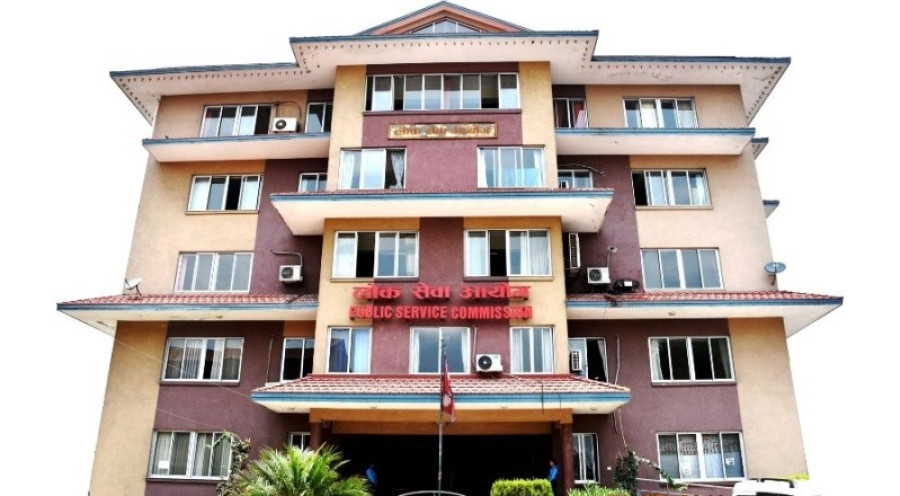Valley
Lawmakers demand Public Service Commission abide by the principle of inclusion and revoke vacancy notice
The commission has defended its call as being based on solid legal ground but lawmakers argue that it contradicts the spirit of the constitution
Binod Ghimire
Lawmakers from various parties, including the ruling Nepal Communist Party, have said the Public Service Commission should revoke its recent vacancy notice, as directed by the State Affairs Committee of the federal parliament.
The lawmakers, at a Monday meeting of the House of Representatives, said that the parliamentary committee had taken the right decision.
Ganga Chaudhary Satgaunwa, a lawmaker from the ruling Nepal Communist Party, said that the State Affairs Committee had correctly directed the commission to terminate its vacancy announcement as it didn’t abide by the principle of inclusion guaranteed by the constitution.
Last month, the constitutional commission issued a vacancy notice for 9,161 staffers at 515 local governments. However, various social inclusion organisations, political parties and sections of society had criticised the notice, saying that it was against the spirit of federalism and the principle of inclusion.
Following widespread criticism, the parliamentary State Affairs Committee on June 10 directed the Ministry of Federal Affairs and General Administration and the commission to halt the recruitment process. The committee held consultations with Minister for Federal Affairs Lal Babu Pandit, officials from the commission, and various technical experts before making its decision.
The commission, however, had called the vacancies for the thousands of positions after consultation with the ministry.
The committee’s directive was in line with Article 293 (Monitoring of the functioning of constitutional bodies) of the constitution, which states: “The chiefs and officials of the constitutional bodies must be accountable and responsible to the federal parliament. The committees of the House of Representatives may monitor and evaluate the functioning, including reports, of the constitutional bodies, other than the National Human Rights Commission, and give necessary direction or advice.”
Pandit, however, has defended the selection notice, saying that the vacancies were announced after conducting a “proper study” of the existing laws and the constitution. He has opposed a halt to the recruitment process, demanding that the House committee prove the rationale behind its directive.
Laxman Lal Karna, leader of the Parliamentary Party of the Rastriya Janata Party-Nepal, said he was dismayed at the way Pandit and commission officials, including chairman Umesh Prasad Mainali, had openly challenged the House committee’s decision.
“Does the country function as per the constitution or at the whim of one minister and one commission chairman?” said Karna.
Lawmakers took serious exception to Mainali’s remarks, who said that unnecessary questions had been raised over the commission’s vacancy call, which stood on solid legal ground.
On Sunday, at the 69th anniversary of the commission, Mainali had said that a law in effect allows the service commission to hire staff for all tiers of government until the provincial public service commissions are formed.
“The constitutional body cannot think of flouting the provisions of the constitution and existing laws,” Mainali said. “It is sad that the issue has been dragged into a controversy.”
Despite the directive from the parliamentary committee, the commission has continued to collect applications for the competition.
“The commission should immediately stop collecting applications and work as directed by the parliamentary committee,” said Chand Tara Kumari, another lawmaker from the Nepal Communist Party (NCP), on Monday.
The commission issued the vacancy notice just when provincial governments were preparing to form provincial public service commissions.
When the commission issued the notice on May 29, the Province 5 Assembly had just passed a law for the formation of its Provincial Public Service Commission. In the third week of April, the Province 2 government had written to the Public Service Commission, asking it not to initiate the process to hire employees for local governments, on the grounds that it was a provincial responsibility.
Article 227 of the constitution states: “Other matters relating to the conduct of business of a village assembly and municipal assembly, rules of procedures of meetings, formation of committees, conditions in which the office of member falls vacant, facilities receivable by members of the village assembly and municipal assembly and employees and offices of the village body and municipality shall be as provided for in the provincial law.”
But the commission had decided to issue the vacancy notice citing Section 12 (5 and 6) of the Employees Adjustment Act, which states that the federal government can request the Public Service Commission to start the recruitment process to fill vacant posts [at local units] until provincial service commissions come into being.
The vacancy announcement had thus faced criticism for infringing upon the jurisdiction of provincial governments.
Since the House committee directed the commission to retract the vacancy announcement, four petitions have been filed at the Supreme Court for and against the vacancy call. Three writ petitioners have demanded a cancellation of the process while one claims that the House committee’s directive is illegal, hence the hiring shouldn’t stop.
Responding to one of the writs, the court has already sought an answer from the commission for failing to adhere to the principle of inclusion. The fate of the move will now be decided by the court.




 18.95°C Kathmandu
18.95°C Kathmandu













